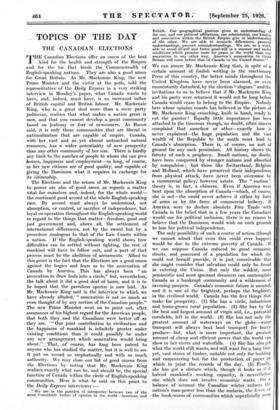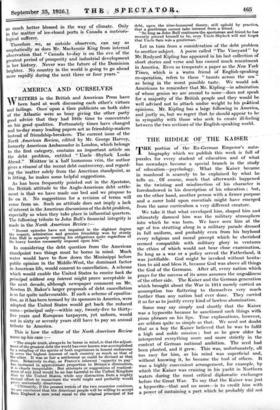TOPICS OF THE DAY
THE CANADIAN ELECTIONS
THk Canadian Elections offer an omen of the best kind for the health and strength of the Empire • .••.• • and for •the tie that binds the Commonwealth of English-speaking nations. They are also a good omen for Great Britain. As Mr. Mackenzie King, the new Prime Minister and the victor at the polls, told the representative of the Daily Express in a very striking interview in Monday's paper, what Canada wants to have, and, indeed, must have, is an increased influx of British capital and British labour. Mr. Mackenzie King, who is a great deal more than a mere party politician, realizes that what makes a nation great is men, and that you cannot develop a great community based on jealousy or fear of newcomers. As Bacon said, it is only those communities that are liberal in nationalization that are capable of empire. Canada, with her _ vast and as yet almost untouched natural resources, has a wider potentiality of new prosperity than any other community of her size. There is hardly any limit to the number of people to whom she can give homes, happiness and employment—so long, of course, as her new citizens are of good quality, and capable of giving the Dominion what it requires in exchange for its citizenship.
The Elections and the return of Mr. Mackenzie King to power are also of good omen as regards a matter vital for ourselves and, indeed, for the whole world— the continued good accord of the whole English-speaking race. By accord must always be understood, not absorption, or control, or sacrifice of independence, but loyal co-operation throughout the English-speaking world in regard to the things that matter—freedom, good and just government and, above all, the settlement of international differences, not by the sword but by a procedure analogous to that of the Law Courts within a nation. If the English-speaking world shows how difficulties can be settled without fighting, the rest of mankind will have to follow suit, and a part of that process must be the abolition of armaments. Allied to this point is the fact that the Elections are a good omen against the bogies and fears as to the annexation of Canada by- America. This has always been "an invocation to draw fools into a circle," but, nevertheless, the talk about it did a good deal of harm, and it is to be hoped that the garrulous spectre is now laid. As Mr. Mackenzie King said in the interview to which we have already alluded, "annexation is not so much as even thought of by any section of the Canadian people." The new Prime Minister went on to point out, after assurances of his highest regard for the American people, that both they and the Canadians were better off as they are. "Our joint contribution to civilization and the happiness of mankind is infinitely greater under existing conditions than it could possibly be under any new arrangement which annexation would bring about." That, of course,- has long been patent to anyone who has studied the matter, but it is well to see it put on record so emphatically and with so, much authority. We may close our list of good omens from the Elections by noting that Mr. Mackenzie King realizes exactly what can be, and should be, the special function of Canada within the circle of English-speaking communities. Here is what he said on this point to the Daily Express interviewer :— _" We are in the position. of interpreter between two of the most formidable bodies of opinion in the world—American and British. Our geographiCal position gives us.. Undeistanding of the one, and our political affiliations, our relationship, our kinship and association within the British Empire give us understanding of the other. We are able to reconcile differences, promote understandings, prevent misunderstandings. We are, in a word, able to avoid ill-will and foster. good-will in a manner and under conditions which• promise more for peace in the world than any association in any other way. America's annexation to Great Britain will come before that of Canada to the United States."
We can assure Mr. Mackenzie King that, in spite of a certain amount of foolish writing in the -reactionary Press of this country, the better minds throughout the United Kingdom have never been alarmed, or even momentarily disturbed, by the election •" slogans" and the invitations to us to believe that if Mr. Mackenzie King and his party were returned it would not be long before Canada would cease to belong to the Empire. Nobot. ly here whose opinion counts has believed in the picture 01 Mr. Mackenzie King crouching, knife in hand, ready to cut the painter ! Equally little importance has been attached to the timorous though, no doubt, often sincere complaint that somehow or other--exactly _.how is never explained—the huge population -and the vast wealth of the Republic to the south, must lead to Canada's absorption. There is, of course, no sort of ground for any such pessimism. All history shows the fatuity of such a prophecy. Small nations, no doubt, have been conquered by stronger nations and absorbed by compulsion ; but those like Switzerland, Belgium and Holland, which have preserved their independence from physical attack, have never been overcome by a commercial policy, however astute. The "suction " theory is, in fact, a chimera. Even if America were bent upon the absorption of Canada—which, of course, she is not—she could never achieve it either by force of arms or by the force of commercial bribery. If America were to declare absolute Free Trade with Canada in the belief that in a few years the Canadians would sue for political inclusion, there is no reason to believe that the Dominion would wish on such grounds to lose her political independence.
The only possibility of such a course of action (though we cannot admit that even this could ever happen) would be due to the extreme poverty of Canada. If we can suppose Canada reduced to great economic straits, and possessed of a population for which she could not herself provide, it is just conceivable that she might consider that salvation could only be found in entering the Union. But only the wildest, most pessimistic and most ignorant dreamers can contemplate Canada as a bankrupt community and a wilderness of ravening paupers. Canada's economic future is assured, and it is one of the brightest, perhaps the brightest, in the civilized world. Canada has the five things that make for prosperity. (1) She has a virile, industrious and home-grown rural 'population. (2) She has by far the best and largest amount of virgin soil, i.e., potential cornfields, left in the world. (3) She has not only the greatest amount of waterways on the globe—water transport will always beat land transport for heavy produce—but, what is more important, the greatest amount of cheap and efficient power that the world can show in her rivers and waterfalls. (4) She has also got what the world still wants, and will want for a long time yet, vast stores of timber, suitable not only for building and carpentering but for the production of paper on which to print the reeords of the day. (5) Finally, she has got a climate which, though it looks as if it halved mankind's. :working capacity, is nevertheless one which does not Involve economic waste. On a balance of account the Canadian winter reduces the nation's man-power less than the malaria, the fever, or -the hook-worm of communities which superficially seem so much_ better blessed in the way of climate. Only in the matter of ice closed ports is Canada a meteoro- logical sufferer.
Therefore we, as outside observers, can say as emphatically as does Mr. Mackenzie King from internal observation that "Canada to-day is on the eve of the greatest period of prosperity and industrial development in her history. Never was the future of the Dominion brighter. No country in the world is going to go ahead more rapidly during the next three or four years."















































 Previous page
Previous page